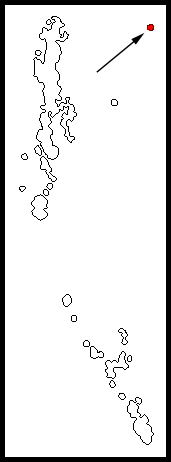| Line 43: | Line 43: | ||
{{GSearch|Aceros+narcondami}} | {{GSearch|Aceros+narcondami}} | ||
*[http://www.orientalbirdimages.org/birdimages.php?action=birdspecies&Bird_ID=338&Bird_Image_ID=13692&Bird_Family_ID=70 View more images of this species on Orientalbirdimages] | *[http://www.orientalbirdimages.org/birdimages.php?action=birdspecies&Bird_ID=338&Bird_Image_ID=13692&Bird_Family_ID=70 View more images of this species on Orientalbirdimages] | ||
| − | [[Category:Birds]] [[Category: Aceros]] | + | [[Category:Birds]][[Category: Aceros]][[Category:Maps]] |
Revision as of 05:01, 27 October 2008
- Aceros narcondami
Identification
With 45-50cm one of the smaller Hornbills, looks like a small version of Papuan Hornbill.
- Black body
- White tail
- Male has rufous head and neck with a shaggy crest
- Female with black head and neck
- Bill yellowish-white with dark crimson base
- Wreathed casque yellow and blackish-brown
- Throat bluish-white
- Skin around eye blue, eyering red
- Juveniles similar to male but with smaller bill and without casque
Distribution
| Endemic to the small island of Narcondam in the Bay of Bengal, east of the Andamans in India. The entire population is estimated at about 300 birds. The island is a wildlife reserve but the small population still suffers from illegal hunting and habitat loss. | |
| Legend |
Taxonomy
Was treated conspecific with Papuan Hornbill. As other Aceros species it's sometimes included in the genus Rhyticeros.
Habitat
Found in mixed evergreen and deciduous forest, from sea-level up to the highest point of the island at 750m.
Behaviour
Feed mainly on fruit, prefering figs. Up to 50 birds have been seen together at a fruiting tree.
Breeding season from February to April. 2 eggs are laid in a nest cavity and are incubated by the female who is fed by the male.
Resident.
References
- Rasmussen, P.C. and Anderton, J.C. 2005. Birds of South Asia. The Ripley Guide. Washington D.C. and Barcelona: Smithsonian Institution and Lynx Editions. ISBN 84-87334-67-9
- Grimmett, R., Inskipp, C. and Inskipp, T. 1998. Birds of the Indian Subcontinent. London: Christopher Helm. ISBN 0-7136-4004-9
- Kazmierczak, K. and van Perlo, B. 2000. A Field Guide to the Birds of the Indian Subcontinent. London: Pica Press. ISBN 0-300-07921-4
- Kazmierczak, K. and Singh, R. 2001: A Birdwatcher's Guide to India. New Dehli: Oxford University Press. ISBN 019-565285-1
- del Hoyo, J., Elliott, A. and Sargatal, J. eds. 2001. Handbook of the Birds of the World. Vol. 6. Mousebirds to Hornbills. Barcelona: Lynx Edicions. ISBN 84-87334-30X





